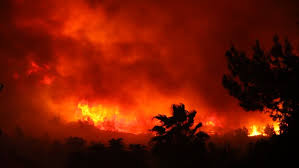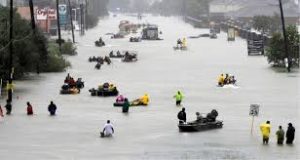It’s raining ash in Portland right now

Western wildfires are climate change symptoms.
While there have been air quality alerts for days now, from a number of fires around the state, a new wildfire blew up over the holiday weekend. What started as the Eagle Creek fire has now expanded into the Columbia River Gorge. One of the nation’s most scenic places is burning to the ground as I write.
It’s a tragedy that a place of unique natural beauty is being utterly destroyed. Perhaps, if you are out of a job or straining to pay your bills, you may not care – I get it. Life is difficult, and for a great many of us, just getting through the day is a challenge. There is no emotional bandwidth for some vague concept like “the environment” or “climate change.”
Because climate change is at work
EXCEPT that “the environment” is the air we all breathe, the land we all share, and the water we all drink. We don’t want to breath smoke (as I am as I write this.) We don’t want 40 miles of normally busy highway shut down by wildfires (as I-84 is right now), thus stopping commuters and commercial drivers in their tracks. We don’t want rising seas literally flooding through the front doors of our homes, as our fellow citizens in Houston just experienced.

Floods and storms are fueled by climate change.
The environment – quite simply – makes all our lives possible. When we damage or pollute or destroy “the environment,” we are hurting ourselves. That’s the point that people seem to miss. It’s not about polar bears – not really. It’s about people. It’s about keeping the planet habitable for ourselves. As it happens, that means keeping it habitable for a lot of other creatures too.
50 inches of rain in one week in Texas is not just “extreme weather.” It’s one more example of the climate change that is all around us now. Climate scientists – who have been raising the alarm about climate change since the 1980s – know that things will only get worse, unless we act. In Oregon, my Senators, my Congressman, and the Mayor of my city all acknowledge the reality, and have been taking steps – for years – to address it. But elsewhere, there’s a lot of denial.
No matter where you live, there is much that you can do to help:
• Believe your eyes. The floods, fires, droughts – that’s climate change in action. It’s not a fluke, and it’s not going to get better on its own.
• Educate yourself. Climate change is not rocket science. Much of it is driven by burning fossil fuels that emit gases like carbon dioxide that get trapped in Earth’s atmosphere. Those trapped gases act like a blanket around the planet, making it warmer and warmer. Warmer air causes more water to evaporate (and come down in torrents) while at the same time drying out huge swaths of land that become tinder for wildfires. And the vicious cycle continues.
• Take whatever actions you can. Large and small, it all helps. Crank the A/C a little less, participate in a beach or river cleanup, recycle everything you can. These suggestions are as valid as ever. But these days, there’s much more you can do to help. Eat less meat, drive a hybrid or electric car, find a job in a booming “green” industry like renewable energy or electric cars. The sky is the limit because the whole economy needs to be re-designed around more sustainable principles. No one has that all figured out yet – which means that you can help.
• Find your climate community. Returning our planet to a healthier state will take all of us. In a time when politicians seek to divide us, don’t let them. Climate science is science. Would you argue that 2+2 does not = 4? Nope. From 350.org to the Citizens Climate Lobby, from GreenBiz.com to organizations that are building a circular economy, from universities like PSU and ASU who focus deeply on sustainability issues to faith organizations that feel called to protect the earth – find an organization where you want to contribute, and do so.
The environment is our home – let’s defend it!

Leave a Reply